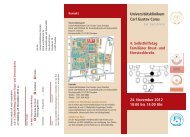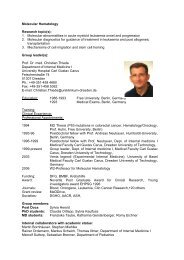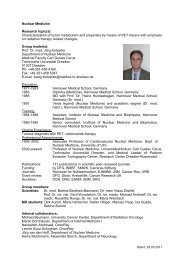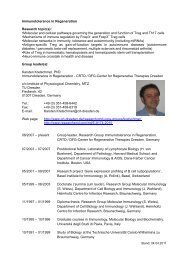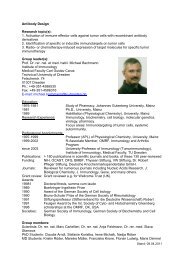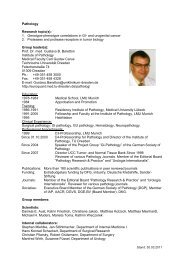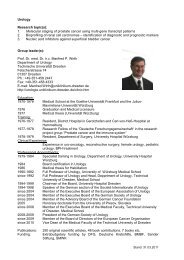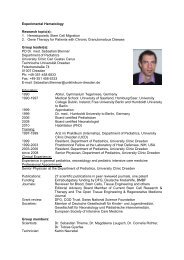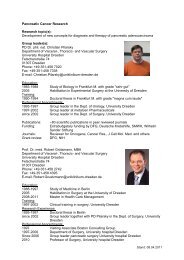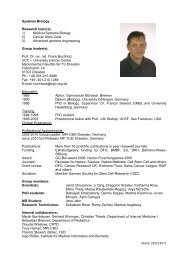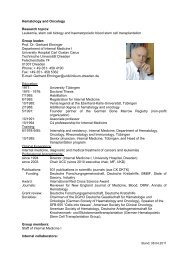Curriculum Vitae - Universitäts KrebsCentrum Dresden - Technische ...
Curriculum Vitae - Universitäts KrebsCentrum Dresden - Technische ...
Curriculum Vitae - Universitäts KrebsCentrum Dresden - Technische ...
Create successful ePaper yourself
Turn your PDF publications into a flip-book with our unique Google optimized e-Paper software.
Experimental Pathology/Angiogenesis I<br />
Research topic(s):<br />
1. Regulation of angiogenesis in tumors<br />
2. Role of hypoxia signaling in tumor progression and metastasis<br />
3. Targeted therapies<br />
Group leader(s):<br />
Prof. Dr. rer.nat. Georg Breier<br />
Department of Pathology<br />
<strong>Technische</strong> Universität <strong>Dresden</strong><br />
Fetscherstraße 74<br />
01307 <strong>Dresden</strong><br />
Ph.: +49-351-458 5278<br />
Fax: +49-351-458 5814<br />
E-mail: georg.breier@uniklinikum-dresden.de<br />
Education:<br />
1978 Abitur, Hebel-Gymnasium Schwetzingen<br />
1985 Diploma (Biology), Center for Molecular Biology, University of Heidelberg<br />
1988 PhD in molecular genetics. Supervisor: Prof. Dr. Peter Gruss, University<br />
of Heidelberg<br />
2004 Habilitation in Biochemistry, University of Würzburg<br />
Training:<br />
1985-1987 Ph.D. student, Center for Molecular Biology, University of Heidelberg<br />
1987-1988 Ph.D. student, Department of Molecular Cell Biology, Max Planck<br />
Institute of Biophysical Chemistry, Göttingen<br />
1988-1992 Postdoctoral fellow, Department of Neurochemistry, Max Planck Institute<br />
of Psychiatry, Martinsried<br />
Research Experience:<br />
Experience in molecular cell biology, mouse molecular genetics,<br />
conditional gene targeting, tumor biology, experimental gene therapy,<br />
vascular biology, angiogenesis research<br />
Professional Appointments:<br />
1993-2003 Research group leader, Department of Molecular Cell Biology, Max<br />
Planck Institute of Physiological and Clinical Research, Bad Nauheim<br />
2003-present Professor for Endothelial Cell Biology/Pathology and Head of Research,<br />
Department of Pathology, <strong>Technische</strong> Universität <strong>Dresden</strong><br />
Lecturer in Biology, Faculty of Medicine, <strong>Technische</strong> Universität <strong>Dresden</strong><br />
Publications: More than 80 scientific publications in peer reviewed journals<br />
Funding: Extrabudgetary funding by DFG, BMBF, EU<br />
Award: EU Descartes Prize 2004 finalist<br />
Journals: Reviewer for PNAS, EMBO J, Cancer Research, and others<br />
Grant review: DFG, Cancer Research UK, FWF Austria, Swiss Cancer League, AICR<br />
Society: Member Deutsche Gesellschaft für Zellbiologie<br />
Group members:<br />
Scientists: Dr. Silvia Krakau<br />
PhD students: Antje Kettelhake, Aleksandar Kuzmanov, Ina Prade, Maryam Rezaei<br />
MD students: Anja Methner, Maik-Oliver Müller<br />
Internal collaborators:<br />
Gustavo Baretton, Department of Pathology<br />
Michael Baumann, University Cancer Center, Department of Radiation Oncology<br />
Stand: 29.03.2011
Triantafyllos Chavakis, Medical Clinic III<br />
Leoni Kunz-Schughart, University Cancer Center<br />
Dirk Lindemann, Department of Microbiology<br />
Alexander Storch, Department of Neurology<br />
Daniel Zips, University Cancer Center, Department of Radiation Oncology<br />
External collaborators:<br />
Ralf Adams, Max Planck Institute of Molecular Biomedicine, Münster<br />
Konstantinos Anastassiadis, Biotec, <strong>Technische</strong> Universität <strong>Dresden</strong><br />
Hellmut Augustin, German Cancer Research Center (DKFZ), University Heidelberg<br />
Lena Claesson-Welsh, Uppsala University, Uppsala, Sweden<br />
Elisabetta Dejana, University of Milan, Italy<br />
Peter Friedl, University of Würzburg<br />
Eckhard Lammert, University of Düsseldorf<br />
Dörte Katschinsky, University of Göttingen<br />
Hugo Marti, University of Heidelberg<br />
Francis Stewart, Biotec, <strong>Technische</strong> Universität <strong>Dresden</strong><br />
Dietmar Vestweber, Max Planck Institute of Molecular Biomedicine, Münster<br />
Participation in collaborative research projects (local, national, international):<br />
Deutsche Forschungsgemeinschaft - SPP 1190<br />
Deutsche Forschungsgemeinschaft - Center for Regenerative Therapies <strong>Dresden</strong> (CRTD)<br />
List of ten most important publications 2005-2011:<br />
1. Klotzsche-von Ameln, A., Muschter, A,, Mamlouk, S.,, Kalucka, J., Prade, I., Franke, K., Rezaei,<br />
M., Poitz, D.M., Breier, G., Wielockx, B. (2011). Inhibition of HIF prolyl hydroxylase-2 blocks tumor<br />
growth in mice through the anti-proliferative activity of Transforming Growth Factor beta. Cancer<br />
Res., 2011 Mar 24. [Epub ahead of print]. *equal contribution<br />
2. Hoelscher, M., Silter, M., Krull, S., von Ahlen, M., Hesse, A., Schwartz, P., Wielockx, B., Breier,<br />
G., Katschinski, D.M., Zieseniss, A. (2011). Cardiomyocyte-specific Prolyl-4-hydroxylase domain 2<br />
knock out protects from acute myocardial ischaemic injury. J. Biol. Chem., 2011 Jan 26. [Epub<br />
ahead of print]<br />
3. Saito, K., Dubreuil, V., Arai, Y., Wilsch-Bräuninger, M., Schwudke, D., Saher, G., Miyata, T.,<br />
Breier, G., Thiele, C., Shevchenko, A., Nave, K.A., Huttner, W.B. (2009). Ablation of cholesterol<br />
biosynthesis in neural stem cells increases their VEGF expression and angiogenesis but causes<br />
neuron apoptosis. Proc. Natl. Acad. Sci. U.S.A. 106: 8350-8355.<br />
4. Labelle, M., Schnittler, H.J., Aust, D.E., Friedrich, K., Baretton, G., Vestweber, D., Breier, G.<br />
(2008). Vascular endothelial cadherin promotes breast cancer progression via transforming growth<br />
factor beta signaling. Cancer Res. 68, 1388–1397.<br />
5. Heidenreich, R., Murayama, T., Silver, M., Essl, C., Asahara, T., Rocken, M., Breier, G. (2008):<br />
Tracking adult neovascularization during ischemia and inflammation using Vegfr2-LacZ reporter<br />
mice. J. Vasc. Res. 45, 437-444.<br />
6. Diez, H., Fischer, A., Winkler, A., Hu, C.J., Hatzopoulos, A.K., Breier, G., Gessler, M. (2007).<br />
Hypoxia-mediated activation of Dll4-Notch-Hey2 signaling in endothelial progenitor cells and<br />
adoption of arterial cell fate. Exp. Cell Res. 313, 1-9.<br />
7. Gille, J., Heidenreich, R., Pinter, A., Schmitz, J., Boehme, B., Hicklin, D.J., Henschler, R., Breier,<br />
G. (2007). Simultaneous blockade of VEGFR-1 and VEGFR-2 activation is necessary to efficiently<br />
inhibit experimental melanoma growth and metastasis formation. Int. J. Cancer 120, 1899-1908.<br />
8. Li, X., Edholm, D., Lanner, F., Breier, G., Farnebo, F., Dimberg, A., Claesson-Welsh, L. (2007).<br />
Lentiviral rescue of vascular endothelial growth factor receptor-2 expression in flk1-/- embryonic<br />
stem cells shows early priming of endothelial precursors. Stem Cells 25, 2987-2995.<br />
9. Breier, G., Licht, A.H., Nicolaus, A., Klotzsche, A., Wielockx, B., Kirsnerova, Z. (2007). HIF in<br />
vascular development and tumour angiogenesis. Novartis Found Symp 283,126-133.<br />
10. Licht, A.H., Muller-Holtkamp, F., Flamme, I., Breier, G. (2006). Inhibition of hypoxia-inducible<br />
factor activity in endothelial cells disrupts embryonic cardiovascular development. Blood 107, 584-<br />
590. An Inside Blood Analysis of this article (author: Greg Semenza) appeared at the front of the<br />
same issue.<br />
Stand: 29.03.2011




